May 16, 2025 | 10:00 GMT +7
May 16, 2025 | 10:00 GMT +7
Hotline: 0913.378.918
May 16, 2025 | 10:00 GMT +7
Hotline: 0913.378.918
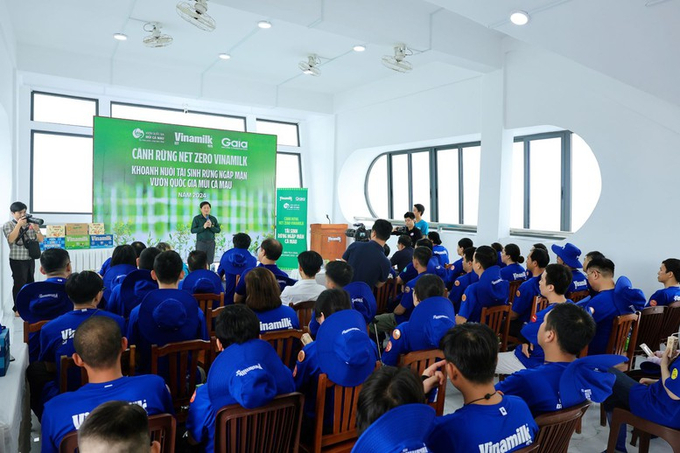
Vinamilk's employees listen to speakers and scientists share about the role of mangrove forests in responding to climate change and sequestering carbon. Photo: PD.
Sitting on a boat, weaving through the mangrove forests for nearly an hour, the faces of the members of the Vinamilk staff group were all bright and excited when participating in the activity "Environment and promotion of natural regeneration of 25 hectares of mangrove forests in Mui Ca Mau National Park" for the second year. The group consisted of nearly 60 members, coming from Vinamilk's offices, branches, and factories in Bac Ninh, Ho Chi Minh City, and Can Tho.
Nguyen Chi Cuong - Director of Tien Son Milk Factory (Vinamilk) - said that he was the group member who had to travel the farthest, more than 2,000 km from Bac Ninh to Dat Mui, Ca Mau. However, the members were excited to contribute a small part to the company's overall Net Zero 2050 goal.
"I have been to the country's southernmost point many times, but this is the first time I have participated in a meaningful activity with my teammates - directly wading through mud to reinforce the fish sauce trap fence. Seeing with my eyes the fish sauce plants growing inside the fence my colleagues helped build a year ago. I feel very touched, happy, and proud", Cuong excitedly said.
Vinamilk's Net Zero Forest in Ca Mau is a mangrove restoration project using a natural regeneration promotion solution, implemented by Vinamilk in collaboration with the Gaia Nature Conservation Center and Ca Mau National Park since 2023.
Thanks to the fence that keeps fish sauce on the alluvial ground and limits human impact, after one year, Vinamilk's Net Zero Forest has been covered with a large area of green by more than 71,000 fish sauce plants, growing well in both quantity and height. Many trees are 40-50 cm tall, with an average density of 2,500-2,800 trees per hectare.
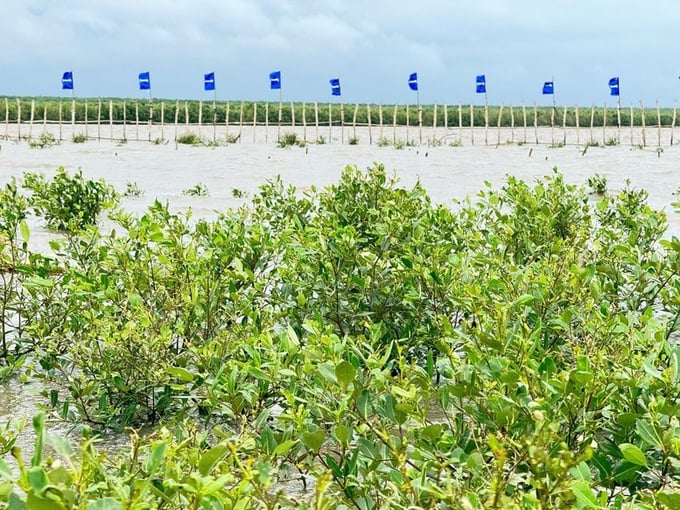
After the first year of protection, the forest had more than 71,000 new trees regenerated. Photo: PD.
Most of the trees have grown their roots above the ground, contributing to the retention of alluvium as well as increasing the ability to absorb carbon. According to Huyen Do - Founder and Director of Gaia Nature Conservation Center - mangrove forests not only have the ability to store carbon in the trunk, leaves, roots, etc. but also in the soil (sedimentary basin). Thanks to that, mangrove forests can sequester carbon 4-10 times higher than terrestrial forests, with a storage time of up to thousands of years.
In addition to its great potential for carbon storage, Vice Chairman of the People's Committee of Ca Mau Province Le Van Su assessed that Ca Mau mangrove forests also contribute significantly to responding to climate change. As the only province with three sides bordering the sea and the second longest coastline in Vietnam, Ca Mau is one of the Mekong Delta provinces most heavily affected by climate change. Each year, the country's southernmost province loses about 350-400 hectares of forest due to coastal erosion.
Since 2020, Ca Mau has begun to mobilize more resources from organizations and individuals to regenerate forests using various methods. In Ca Mau Cape National Park alone, the total area regenerated in the past four years is more than 300 hectares, only approximately equal to the forest area the province loses yearly. It further demonstrates the need for more effective, drastic, and rapid coordination and the mobilization of more resources.
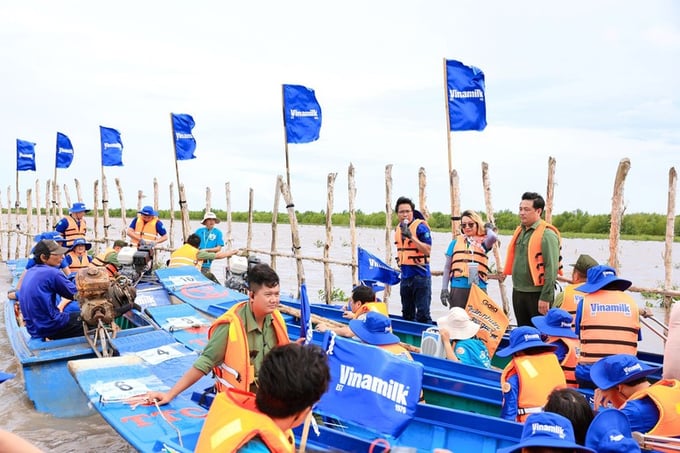
Vinamilk conducts annual employee forest regeneration activities to contribute to the Net Zero Forest project. Photo: PD.
Vinamilk's natural forest regeneration promotion activities in Ca Mau are part of the Net Zero Forest Project. The specific goal is to regenerate 25 hectares of forest in the core area of the national park, with about 100,000-250,000 trees growing after 6 years. When completed, this will be a carbon sink with an estimated reserve of about 17,000-20,000 tons of carbon, equivalent to 62,000-73,000 tons of CO2.
In addition to the existing fence protecting the protected area, Vinamilk also coordinates with Gaia and Mui Ca Mau National Park to conduct patrolling, monitoring and protecting the forest; communicating to raise awareness of forest protection for local people... In addition, closely coordinate in surveying and measuring the growth capacity of the forest every year to serve as a basis for calculating the carbon absorption capacity in the future.
Vinamilk is considered a model of sustainable development in Vietnam today and is a pioneer in announcing the roadmap towards Net Zero by 2050. In particular, Vinamilk Net Zero Forest in Ca Mau is one of the enterprise's practical activities to form carbon sinks from forests in the future. Before this project, Vinamilk also implemented the project "One Million Trees Plantation," with more than 1.1 million trees planted in 20 provinces and cities.
Translated by Huong Giang

(VAN) Veterinary training should focus on quality, not just quantity. Veterinarians also need more options to pursue specialized training.

(VAN) The veterinary industry needs to be viewed objectively and further invested in to properly demonstrate its role and importance in the new context.

(VAN) The number of veterinarians graduating each year is not enough to meet actual needs, hence a difficult problem for the growing livestock industry.

(VAN) The strategic partnership between Cambodia, the Philippines, Vietnam, and CGIAR ensures that innovative solutions effectively address national priorities for food system development.

(VAN) This was affirmed by the UK Minister of State at the Department for Environment, Food and Rural Affairs during a working session with Deputy Minister Tran Thanh Nam on May 13.
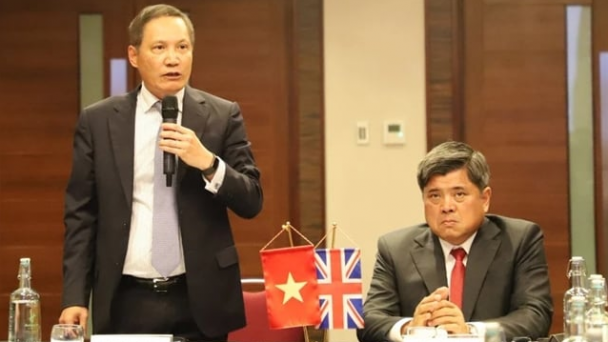
(VAN) On May 13, the Ministry of Agriculture and Environment, in coordination with the Embassy of Vietnam in the United Kingdom, organized a seminar titled 'Connecting trade in Vietnam-UK agricultural, forestry, and fishery products'.
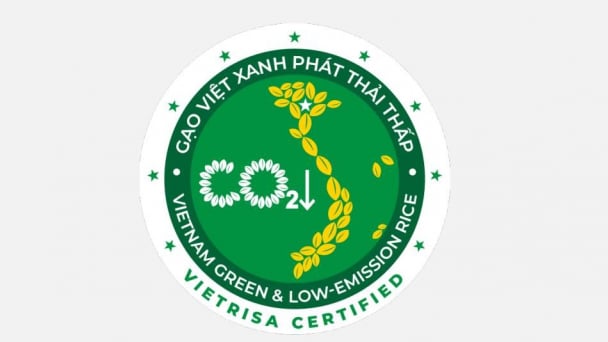
(VAN) The launch of the Vietnam green and low-emission rice brand is a positive signal for both businesses and farmers, marking readiness to reach new heights in the global market.